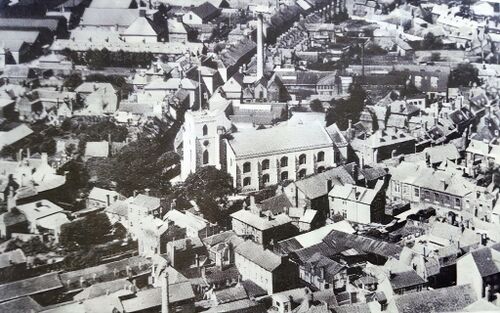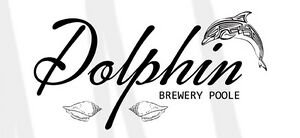The History of the Dolphin Brewery, Poole
The Story behind the Dolphin Brewery, Poole
By
Richard Pride
The origins of the Marston's Dolphin Brewery Ltd in Poole are generally accepted to have been before 1745 and that the founder was John Strong, who was described as a butcher and brewer, who bequeathed a malthouse in Market Street to Thomas Strong Snr.
However there is some discussion within the family that it may have even been John Strong Snr. That said it was started in an outbuilding behind the Dolphin Inn and had a malthouse in Market Street, taking its name from the towns coat of arms signifying the king of the sea and Poole connection to it.
It stayed in the family until the death of John Strong Jnr in 1818, when the brewery was inherited by Thomas Adey (John’s brother in law) and William Adey. By this time there were two major breweries in Poole (Dolphin Brewery and the Towngate Brewery) and tradition has it that the smell of brewing and yeast would hang heavy over the town on brew days. Being a port with heavy connections to the Newfoundland fishery industry there was a great demand for local ales, as well as a healthy trade in wines and spirit imports both legitimate and smuggled.
After a family disagreement, the brewery and its assets were sold to a R. Miller and then on to Tom Rickman in 1838, whose sons, Tom Jnr. and Joseph ran it until 1860. At the time of transfer the assets are recorded as including several malthouses, considerable estate, public houses and a fifteen quarter steam-powered plant.
In 1864 Henry Emmott joined Tom at the brewery and then in 1867 Tom was bought out by John Marston, and Francis Mullins which then traded as Emmott Mills and Marston. John Marston was already a brewery owner from Market Deeping in Lincolnshire who had moved down to Poole and shortly after John took complete control the following year in 1878, see:- Market Deeping Brewery.
With John in control of the company the business started to expand acquiring local public houses as well as an extension of the brewery in 1886, designed by architect Peter Lyle Henderson. John also knowing the importance of good quality water in the brewing of beer made many improvements in the town's water supply including new wells and even a pump on the Quay by the Town Cellars to provide clean water to the public and visiting ships.
By 1870 the brewery had in the region of 70 tied houses from the Purbeck area as far as Southampton and had its logo registered as a trademark in 1879.
The towns coat of arms had been the basis of the logo for the brewery Dolphin Brewery which contained wavy bars of black and gold representing the sea and a dolphin, flanked by barley and hops.
When the Market Deeping brewery was taken over by Soames & Co. Ltd in 1885, his son William also moved down with his family becoming a company director when the company incorporated in 1897.
Over the following few years the company continued to expand taking over more licensed houses from the A. & T. Sibeth at the Crown Brewery, Fontmell Magna and the Heath Poult Inn Brewery in Bournemouth, see:- Hilda Ogden, Bournemouth Brewery.
Following the death of Walter in 1915 the company continued for ten more years until It was acquired, along with 59 tied houses, by Strong & Co Ltd of Romsey Ltd, Romsey, Hampshire, in 1926 and then was finally liquidated in 1928.
Sadly the brewery was demolished in 1974 with very little remaining other than a malt house and the pubs.
The Dolphin logo returned in the 1980s when David Rawlins started the Poole Brewery which was initially located in an old engineering workshop on Sterte Ave. In the mid 1990s it transferred to the Brewhouse changing its name to The Brewhouse, Poole at the same time
However due to rising costs of operation and land in Poole it was sold and the equipment moved to the Bankes Armes, Studland in May 2003
In 2019 it was restarted by Richard Pride and Mike Garrett with the aim to bringing back old historical beers, alongside brewing new beers that reflect the historic and beautiful area of Poole. They also want to research and document the brewery history, track down local hops, geolocating the inns and associated buildings.

